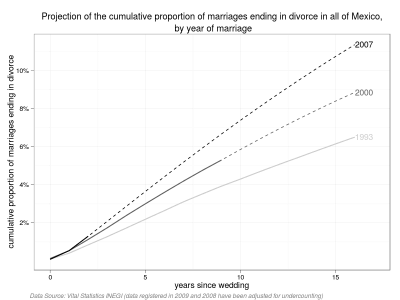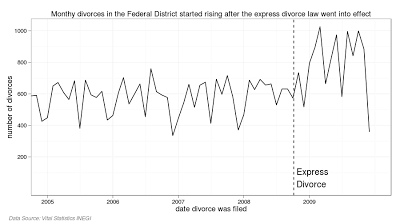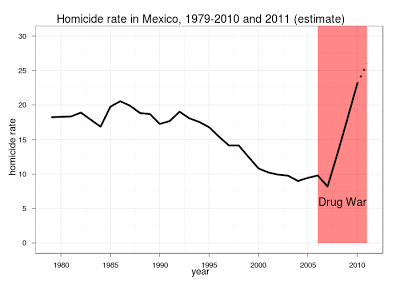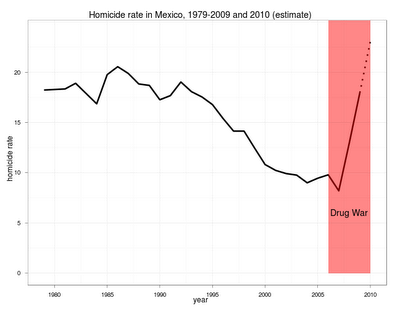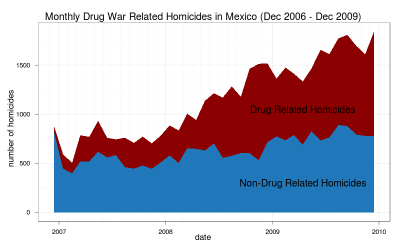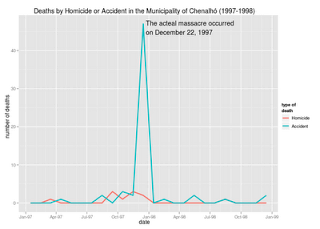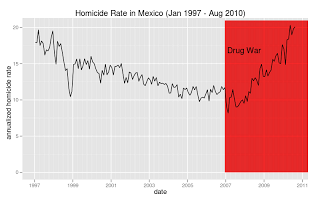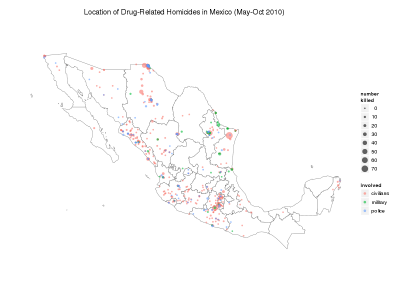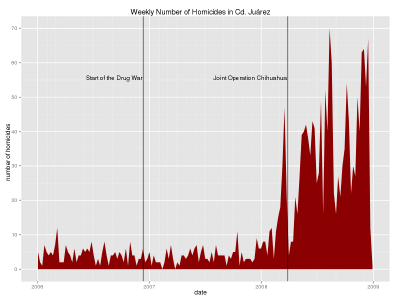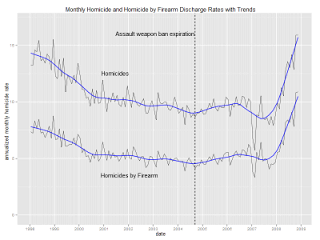Over the last two decades families in Mexico have undergone rapid social changes. The proportion of marriages ending in divorce has risen for each cohort since data became available, this is independant of the recently approved express divorce law in the Federal District.
Tag: r | Atom Feed
On October 2008 Mexico’s capital, the Federal District, approved a version of no-fault divorce locally known as “express divorce”. With the new law the requesting spouse no longer had to provide a cause to dissolve the marriage and the couple no longer had to live apart before filing for divorce. Furthermore, the process of determining child custody and alimony were now separate from the divorce trial. The Federal District has so far been the only federative entity in Mexico to adopt a less adversarial divorce system.
Recently the Mexican government released to the public the final homicide data for 2010, and as you can see from the chart Mexico has suffered from a steep rise in homicides since 2008, and in 2010 reached the highest homicide rate in recent history.
Just today the Mexican government released to the public the mortality database for 2009, and as you can see from the chart Mexico has suffered from a steep rise in homicides from 2008 onward and very likely reached the highest violence rate in recent history last year. Since the Mexican government also recently made available a database of homicides presumably linked with the drug war we can divide homicides into those related to the drug war an those that are not:
I’ve written before about how I couldn’t find the Acteal Massacre in the homicide database available at the INEGI. So I decided to check if the deaths that occurred as a consequence of the massacre were misclassified as other types of violent death,
The Mexican government recently released data on all crime statistics from January 1997 to October 2010, as reported by the various police forces operating in Mexico. This information provides an unprecedented look at what has happened since the drug war began and allows for a frank assessment of the deterioration of security in Mexico.
There have been some very good visualizations of the Wikileaks data so I decided to create one of the drug war in Mexico
Ciudad Juárez became the most violent city in Mexico as a consequence of the vicious war between the Juárez Cartel and the Sinaloa Cartel. So far more than 6,500 people have been murdered in this city since the war started. With the Juárez Cartel significantly weakened, 2010 is set to be the most violent year yet…
Here are some statistics of the dead of Juárez:
There has been a lot of attention paid to the role of US guns exacerbating the violence in Mexico. The assault-weapon ban expired on September 14, 2004, but with the recent spiraling of violence in Mexico the ban has attracted renewed attention. Just recently the Mexican President stood before the American Congress and blamed the assault weapon ban for the rising violence in Mexico, seemingly without proof. This post will try to clarify some of the issues surrounding the controversy.
I think it would be fair to say that the conventional wisdom by scholars who have studied the ban would be the one Christopher Koper, Daniel Woods and Jeffrey Roth stated: “We cannot clearly credit the ban with any of the nation’s recent drop in gun violence.” In other words, the assault weapon ban had no significant effect—at least where the United States is concerned. And as far as I know there are no studies of the effect of the ban expiration on Mexico.
As is well known, gun control is politically charged issue, not only in the United States, but also in Mexico. For example, after two students died in a shootout between the army and cartel gunmen, the rector of what is arguably Mexico’s best university stated:
For me [Rangel Sostmann] the solution is that Mexico and the United States must change their policies. And the policy right now is for the United States to send the money and weapons, and Mexico puts the dead and the drugs. And that ultimately is not going to work, it’s not a question of driving the Army out, the problem is that you have to change the policies, in this case the United States policy.Later an investigation by the National Human Rights Commission concluded that the army had used excessive force, impeded the investigation, planted weapons on the students, possibly tortured them for several minutes, and then shot them at point blank range. The day after the report was released, the ITESM bestowed upon the Secretary of Defense the “AdHonorem” award, given to persons whose works have contributed in an outstanding manner to the “the fight against injustice.” As you can see gun control has become extremely politicized, to say the least.
—Rangel Sostmann, ITESM Campus Rector
With politics hopefully out of the way, let’s look at the homicide data with a seasonal decomposition by loess:
As you can see from the charts there was an increase in the number of homicides and homicides with firearm that coincided with the expiration. The big drop at the start of 2007 was due to the military operations in Michoacan and Acapulco, and also to a temporary drop in the homicide rate of Mexico City (which had nothing to do with the drug war).
Unless otherwise stated, the content of this page is licensed under the Creative Commons Attribution 3.0 License, and code samples are licensed under the Apache 2.0 License. Privacy policy
Disclaimer: This website is not affiliated with any of the organizations or institutions to which Diego Valle-Jones belongs. All opinions are my own.
Special Projects:
- Mexico Crime Rates - ElCri.men: Monthly Crime Report for all of Mexico
- Mexico City Crime - HoyoDeCrimen.com: Geospatial crime map of Mexico City
- Mexico City Air Quality - HoyoDeSmog
Blogs I like:
